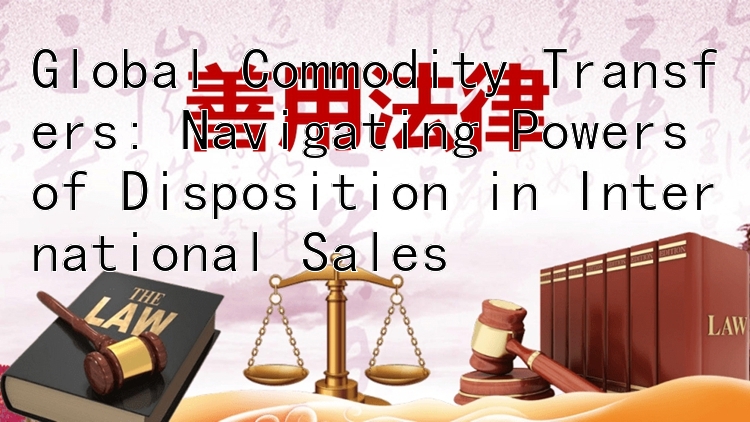Global Commodity Transfers: Navigating Powers of Disposition in International Sales
In the complex world of international trade, where goods traverse borders and legal jurisdictions, understanding the concept of "powers of disposition" is crucial for businesses engaging in cross-border transactions. The term refers to an individual or entity's authority over goods during transit, which can have a significant impact on contracts of sale, risk allocation, and dispute resolution. This article aims to provide a comprehensive overview of powers of disposition in global commodity transfers, drawing upon relevant case law and legislation from various jurisdictions.
Defining Powers of Disposition
Powers of disposition refer to the right of ownership and control over goods that are being transported internationally. It encompasses the ability to decide the fate of these goods—whether it be selling them, transferring them, destroying them, or donating them. In the context of international sales, this power often arises as a contractual issue between buyers and sellers, with implications for both parties' rights and obligations under their agreement.
Case Example: The Zapata [1984] 2 Lloyd’s Rep. 507
This English Court of Appeal case provides insight into how courts interpret the scope of powers of disposition. Here, a seller had sold some steel plates but retained the power to dispose of the goods until payment was made. When the buyer failed to pay, the seller resold the goods at a higher price without informing the original buyer. The court held that the seller's retention of the power of disposition allowed them to mitigate damages by re-selling the goods, even though they were still technically bound by the original contract with the first buyer.
Key Legal Considerations
Navigating powers of disposition involves careful consideration of several key legal aspects:
-
Contract Formation and Performance: International sales contracts typically include clauses addressing who has the power to make decisions regarding the goods throughout the supply chain. These provisions may cover issues such as the transfer of title, delivery terms (e.g., Incoterms), and default remedies if one party fails to fulfill its obligations.
-
Applicable Law: Determining the governing law of the contract is critical, as different national laws approach powers of disposition differently. For instance, common law systems like those found in many former British colonies emphasize freedom of contract and allow parties considerable latitude in defining these terms, while civil law systems often impose more standardized rules.
-
Risk Allocation: Who bears the risks associated with loss or damage to goods during transport? This question is closely tied to powers of disposition because whoever controls the goods also assumes certain risks. Parties must consider insurance coverage, potential liabilities, and indemnification agreements when negotiating contracts involving international transfers.
-
Customs Regulations: Importing and exporting goods across borders requires compliance with customs regulations. Importers need to clear goods through customs before taking possession; meanwhile, exporters must ensure proper documentation and adherence to import/export restrictions. Non-compliance could lead to fines, delays, or seizure of the goods.
-
Human Rights and Environmental Obligations: Increasingly, companies face ethical considerations related to human rights abuses or environmental degradation linked to their supply chains. Corporate social responsibility policies and sustainability initiatives may influence the exercise of powers of disposition, especially when dealing with sensitive commodities or high-risk suppliers.
-
Financing and Security Interests: Lenders financing international transactions often require security interests over the goods. Such interests can affect the ability of the debtor (usually the importer or buyer) to freely dispose of the goods, potentially leading to conflicts with other secured creditors or lien holders.
Case Example: Cargill Financial Services International v Mark Anthony Brands Canada Ltd (2013 ONSC 3785) In this Canadian case, Cargill claimed a security interest in certain wine inventory as collateral for loans provided to Mark Anthony Brands Canada Ltd. However, Mark Anthony argued that it had full power to sell the wine despite the alleged security interest. The court considered the specific language used in the loan documents and determined that Cargill indeed had a valid security interest, restricting Mark Anthony's ability to unilaterally sell off the collateralized assets without Cargill's consent.
Conclusion
Effectively managing powers of disposition in global commodity transfers requires a nuanced understanding of commercial law principles, including contract formation, property rights, and risk management strategies. Companies should draft contracts carefully, considering all possible scenarios and contingencies that might arise during the life cycle of the transaction. Additionally, staying abreast of changes in domestic and international law affecting commerce is essential for ensuring smooth operations in today's interconnected marketplace.